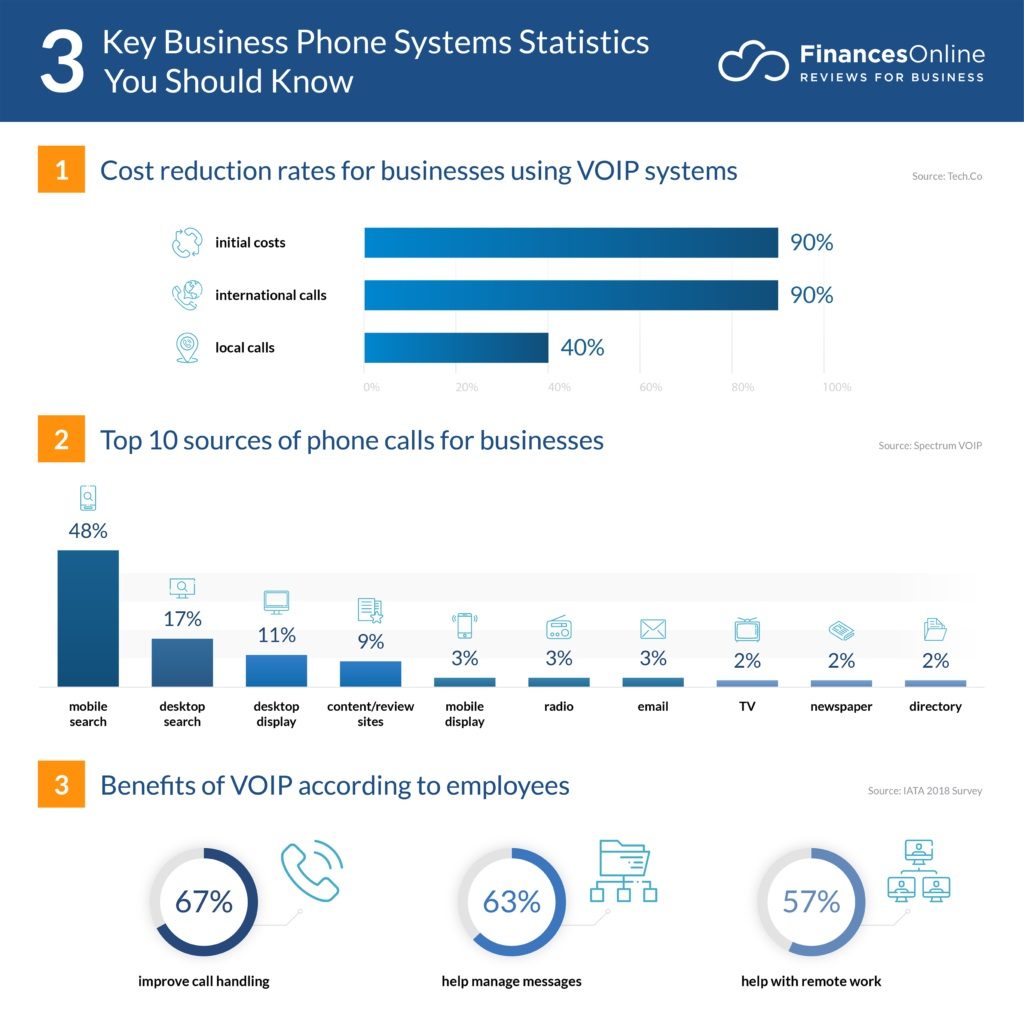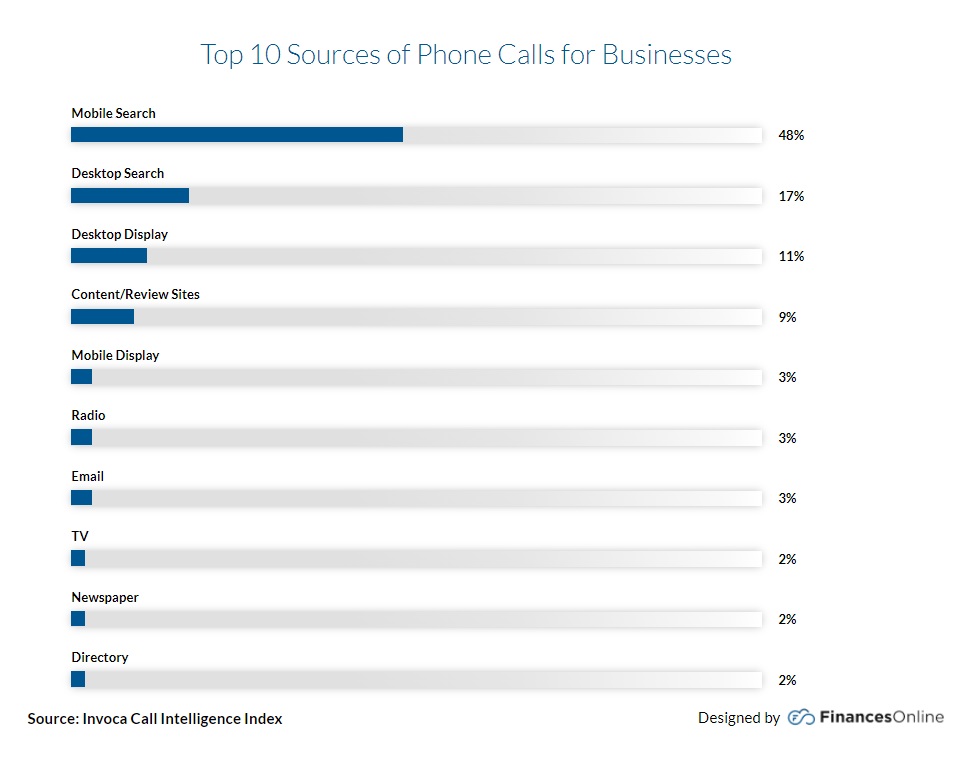Choosing, or upgrading to, a new phone system isn’t a decision you can take lightly. Your communication with your clients and partners will make a big difference to your efficiency.
Small business owners need to think about Internal communication too. If your lines of communication aren’t clear, it has a knock-on effect. Orders being delayed, customer requirements not being met and more.
Types of phone systems for small businesses
The first thing you need to know is the different types of phone services. Traditional systems are becoming less popular as online services grow.
1. Virtual phone systems
Virtual phone systems allow you to route your main business number to other lines like employees’ mobile devices. This is useful for small remote teams.
If you’re the kind of hands-on boss who’s often out of office, small business phone systems can allow you to take calls from your mobile as though you were still at your desk.
These systems are frequently installed as a mobile app. They’ll usually offer additional services like voicemail, virtual receptionists and call screening. They also provide a different ringtone to your mobile phone so you know when it’s the office and when it’s a personal call.
You need to be aware that this isn’t a fully online phone system. These services will still use your provider’s network for call connections.
2. Landlines (PSTN & PBX)
PSTNs are your standard landline. They’re not suitable for business use as you would need a separate line for each employee, making them cumbersome and expensive.
PBX systems are the traditional business solution. This relies on on-site hardware to create multiple phone extensions, call forwarding to your telephone system.
This method was popular in the past and many businesses still default to the traditional phone line. However, fewer providers are offering these services and the technology is becoming obsolete due to the rise of cloud services.

3. VoIP
Voice over Internet Protocol services are a modern solution to business communications. VoIP uses your existing internet connection to receive and route calls. There are advantages of this kind of office phone system for a small business. You only need the internet connection and computing equipment you already use.
You could buy VoIP phone system enabled handsets but you can also use a PC, laptop or smartphone with a headset. The equipment cost saving for a small business is significant. Add to this that, compared to a fully-featured PBX system, a VoIP system will have a lower service charge. You can also connect remote workers to a system like this with ease.
The caveat is that you’ll need a stable internet connection to give consistent service. Let’s be honest though, for a modern SME, a stable broadband connection should be your first priority.
4. Cloud and on-premises systems
VoIP systems come in two main types, on-premise or cloud-based (managed) services. On-site services, also referred to as IP PBX, require large initial outlays. This makes them unsuitable for many SMEs. The advantage is that you own and control your system.
Cloud services give you access to unified communications across your business. They’re generally more accessible for small businesses as these are third-party managed services.
Pricing is a factor when choosing a new phone system. Cloud services can provide all the functionality of a premium PBX service in a more cost-effective way. Choose your provider carefully, as any downtime for them will mean downtime for you.
Understanding the cost of setting up a business phone system
All different phone system options come with their own associated costs. The most expensive option is to build your own PBX or IP PBX service. This is due to a large initial investment required for equipment and skilled technicians.
Managed options, both for landline and VoIP services, are much cheaper in the short term. Ongoing service contracts, however, can cost your business more in the long term.
You also need to consider what equipment you’ll need. Are you buying a suite of VoIP-enabled desk phones? Are you planning on using PCs as softphones? Additional hosted phone services, like call waiting, also carry additional charges.
What to look for in a business phone system
Your phone system must suit your business needs. There are several factors you should look at before making a decision.
-
Quality
There are two separate things to consider here. Call quality and reliability. VoIP systems will give higher call audio quality, especially when routing to mobiles. However, this depends on the reliability of your provider and your broadband connection.
For reliability, on-site systems offer the most control. Your IT or telecommunications team will be in charge of maintaining the service. This means the responsibility to plan and control downtime for maintenance falls on you.
-
Price
Make sure you balance the initial outlay against long-term costs to make the best decision for your business. Also, consider feature support and technical support as part of your cost analysis.
-
Security
Security needs to be a priority in your decision making. Conversations with customers and clients will often involve the disclosure of personal information. With your telephony system connected via IP PBX or VoIP, call recordings are easily logged.
Both managed and on-site services are capable of offering the same level of security. The main difference is whether you or a third party will be responsible for securing the system.
-
Mobility
Consider whether you need a remote communications solution. If you’re totally office based, then it’s not a priority. If you’re a highly mobile or remote business, then it is.
For example, maybe you have account managers who are always on the move. Having these employees’ mobiles connected to your central phone system makes them reachable for clients and colleagues.
-
Vendor support
The level of support you need will affect your choice. You’ll want access to 24/7 support if you’re a 24-hour business. If you only operate within office hours, then you don’t need that comprehensive support package.
-
Features
If you’re going for a third-party managed option, the features will vary between providers and service levels. Make a list of any features your business considers essential and any that are desirable. Then compare service charges based on these requirements.
Must-have small phone system features
There are certain features you should be looking for as standard – it’s up to you how much of the following list will apply to your business.
Voicemail to email
This useful feature of VoIP services can record voicemail messages and send them to an email inbox. If you integrate this with your CRM system, then voicemail emails can be tied to client accounts. This makes it easier for your call centre staff to keep on top of customer accounts.
Auto-attendant
Auto attendants are also known as virtual receptionists and are usually recorded message lines. They will greet customers and ask them to select from a list of departments before directing the call. This can smooth out your workflow, especially for larger businesses.
Call forwarding
This is the most basic feature you will be looking for. The ability to forward calls from a central phone number to the relevant staff member or department. This can also be useful for redirecting old numbers.
Call parking
You can think of call parking as an advanced hold service. Calls are assigned numbered ‘parking bays’ and any employee with access can continue the call. This is useful for remote work or if several staff members need to work on an issue.
Call queues
Call queues are an essential feature for call centre businesses. These automated systems place customer calls into a queue. An automated message lets the customer know their number in the queue, with estimated wait times included.
Call transfer
Another essential feature for a multi-department business. This is uniform to most analogue and digital phone services. Hunt groups can be used to route calls to multiple numbers
The main difference between services here is that VoIP will often make this a no-cost feature. Whereas a landline will incur standard-rate charges.
Music on hold
Automated greetings and hold music can go a long way in making a client’s call more enjoyable. Most managed services will offer this as an option. If you’re running your own service, bear in mind that there will be licensing to consider unless you use copyright-free music.

Conference calls
Conference calling will be an important feature if you have a highly collaborative remote team. It’s also necessary for businesses where department heads may be split across different locations.
VoIP will usually allow for the easiest access to conference calls. This is because it allows anyone, no matter how remote, to join the call with their internet connection.
Call recording
Call recording and monitoring are important for all sorts of reasons. Training, KPI tracking, dispute resolution and more. Having a VoIP service linked to a CRM system will allow you to log and record calls and access them from a single central location.
Call logs
You might also want an easy way of tracking basic data about incoming calls: caller ID, duration, time to answer etc. A VoIP system can record this data automatically in real-time.
Unified communications
If you’re dealing with telephone networks on a regular basis, you’ve probably heard the terms SIP and SIP trunking recently. Session Internet Protocol (SIP) is a VoIP service that allows the sharing of multimedia content through your phone system.
You might also hear SIP trunks referred to as ‘unified communication platforms’. These are fairly advanced services that include video conferencing, voice mail, email and instant messaging. But, if you also want to share things like streaming media or virtual whiteboards on conference calls, you’re going to need one.
Find the best deal for your business
Finding the best deal for your business will mean knowing your requirements. A local Australian retailer might only need to concentrate on their domestic phone capabilities. If they want to expand outside of Australia though, international communication suddenly becomes a priority.
If you don’t know your NEC from your NBN, then it’s probably a good idea to go with a managed service option. Let the telephony experts handle the phone system. Options from large and trusted providers like Microsoft are readily available.
Originally published 14 Mar, 2022, updated 24 Mar, 2023







